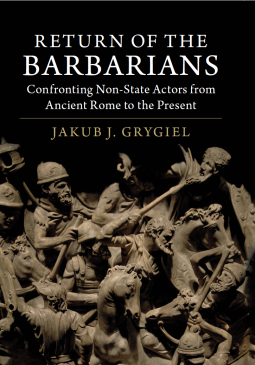
RETURN OF THE BARBARIANS
Confronting Non-State Actors from Ancient Rome to the Present
by Jakub J. Grygiel
This title was previously available on NetGalley and is now archived.
Send NetGalley books directly to your Kindle or Kindle app
1
To read on a Kindle or Kindle app, please add kindle@netgalley.com as an approved email address to receive files in your Amazon account. Click here for step-by-step instructions.
2
Also find your Kindle email address within your Amazon account, and enter it here.
Pub Date Aug 01 2018 | Archive Date Jun 13 2018
Talking about this book? Use #ReturnOfTheBarbarians #NetGalley. More hashtag tips!
Description
“To justify the study of premodern history may be less necessary than a preventive defense of the term ‘barbarian’, a term that can raise criticism from many fronts. One reproach is that it carries denigrating connotations of cultural inferiority and barbaric behavior, traits that after all are not unique to non-state groupings. Consequently, it is seen less as an analytical concept than as a slur. But in its simplest usage, ‘barbarian’ referred to groups that spoke a different, incomprehensible language. It was not necessarily an insult but an all-encompassing description of foreign groups. And the word ‘barbarian’ points more to the user of this term, rather than the subject defined by it: It shows the inability to understand the groups in question.”
Barbarians are back. Fascinating, bold and succinct, Return of the Barbarians: Confronting Non-State Actors from Ancient Rome to the Present by Jakub J. Grygiel makes a powerful case that modern strategists have everything to gain by studying premodern societies.
Return of the Barbarians: Confronting Non-State Actors from Ancient Rome to the Present is a brilliant and thought-provoking examination of premodern history to illuminate contemporary challenges.
Advance Praise
Jakub J. Grygiel's Return of the Barbarians combines a bold, original thesis with supreme erudition. This is political science merged with classical studies in the service of making the reader see the world differently and more profoundly. Even the footnotes are fascinating. A perfect historical guide to the current era.
Robert D. Kaplan, author of The Return of Marco Polo's World: War, Strategy, and American Interests in the Twenty-First Century
Do modern strategists have anything to gain from a close study of the strategic challenges faced by premodern societies? Jakub J. Grygiel thinks so, and he has a powerful case to make. As he demonstrates in detail, premodern societies often had to cope with a strategic threat posed by non-state actors - such as pirates, brigands, and barbarians situated on their frontiers or in the mountains, deserts, and swamplands they left ungoverned - that is quite similar to the threat that the pirates, brigands, and barbarians active today now pose to us.
Paul Rahe, author of The Spartan Regime: Its Character, Origins, and Grand Strategy
Throughout history, small decentralized bands of fierce mobile warriors have emerged from ungoverned spaces to threaten the security, and at times even the survival, of more settled and seemingly stronger communities. In his provocative new book, Jakub J. Grygiel argues that, with the rise of global terrorism, the 'barbarians are back'. To defeat them, today's policymakers must study and learn from the past. This is a brilliant and highly original use of premodern history to illuminate contemporary strategic challenges.
Aaron Friedberg, author of A Contest for Supremacy: China, America and the Struggle for Mastery in Asia
A fascinating, briskly written excursion into the ways we conceptualize premodern history and modern times - and how our current and future strategic landscape may resemble the former more than the latter. The future premodern world - one characterized by the rise of violent non-state actors in pursuit of non-territorial objectives, the proliferation of lethal technologies that allow barbarian groups to punch above their weight, and the opening of ungoverned spaces that allow them to prosper - is a strategic landscape in which deterrence and diplomacy lose some of their effectiveness and, accordingly, international relations become more violent. In this highly perceptive and entertaining book, Grygiel compellingly argues that the new barbarian menace will likely force states to decentralize power, activating their populations to provide for their own security.
Randall Schweller, author of Maxwell's Demon and the Golden Apple: Global Discord in the New Millenniu
Available Editions
| EDITION | Paperback |
| ISBN | 9781316611241 |
| PRICE | $28.99 (USD) |
Average rating from 7 members
Readers who liked this book also liked:
John Kotter; Holger Rathgeber
Business, Leadership, Finance, Nonfiction (Adult)


















